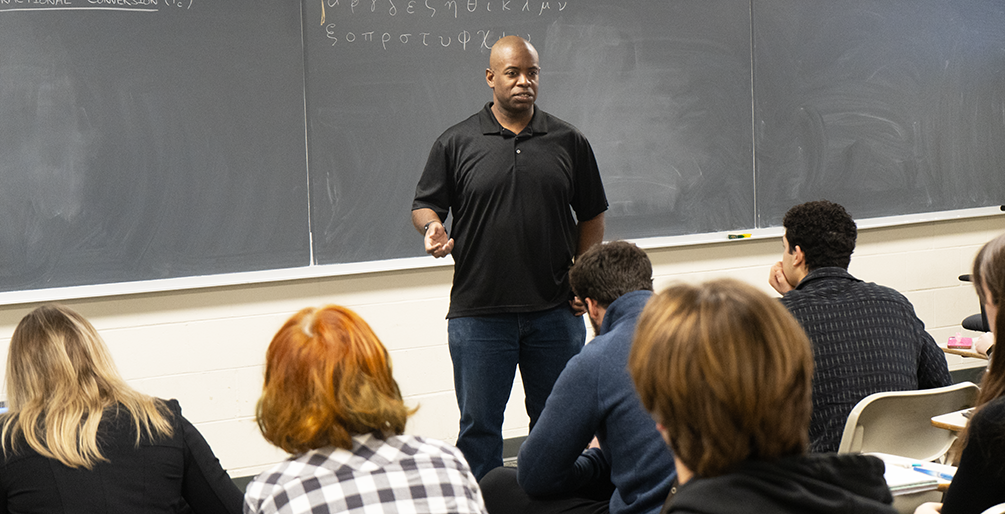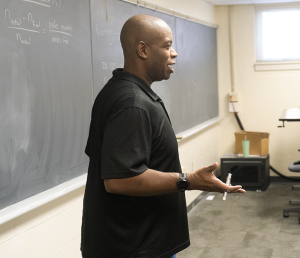Published on Feb. 27, 2024

Reginald Rogers woke up on June 18, 1999, and expected it to be a fairly uneventful day. Rogers was at home in Atlanta, Georgia, enjoying a well-deserved break after finishing his sophomore year at the Massachusetts Institute of Technology (MIT). Late in the afternoon, Rogers hopped in his car for a quick trip to pick up his father.
He never made it to his destination.
Rogers was involved a terrible accident, one that kept him in surgery for 14 hours and unconscious for three days. When he awoke, he had no memory of the collision and was welcomed with some harsh news – doctors weren’t sure if he would ever walk again. Rogers let those words settle for a minute. Surprisingly, a sense of determination came over him. Never one to back down from a challenge, Rogers wanted to start rehab as soon as possible.
While it was a miracle that Rogers survived the crash, his recovery was even more incredible. He took his first steps within three weeks, and it only took five months for him to fully recover. Rogers was even able to graduate from MIT on time. He would go on to earn his master’s degree from Northeastern University and his Ph.D. from the University of Michigan.
Now, as an associate professor of chemical and biomedical engineering in the University of Missouri College of Engineering, Rogers shares his survival story with his students, but not to garner sympathy. He wants to give them hope and show them that they are capable of accomplishing difficult things.
“I shouldn’t be here … having these conversations with students; I should be six feet under,” said Rogers, who is also the director of graduate studies for the Department of Chemical and Biomedical Engineering and an affiliate faculty member in the Honors College. “Nothing is impossible. People kept telling me no. I was determined to prove them wrong. I’m willing to push my students to keep climbing the mountain. When things look too hard, I encourage them to keep going. At the end of the day, it’s not always going to be easy. They also have to understand that it’s OK to fail. Those moments build character.
“I love what I do. Each day continues to be an adventure.”

Teaching has always come naturally to Rogers. He aided children and adults alike as a swimming instructor and seamlessly stepped into a teaching role during his master’s degree when his advisor had to take an extended leave of absence. After finishing his degrees, Rogers took on an assistant professor role in the Department of Chemical Engineering at the Rochester Institute of Technology (RIT). He had the opportunity to help build the program from the ground up.
Rogers joined Mizzou in 2019 after his time at RIT.
“Balance is very important to my teaching philosophy,” Rogers said. “You have to put in hard work, but I’m happy to celebrate when the work is done. I’m a nurturing guy, but I also expect students to put in a strong effort.”
Rogers has a shelf full of awards that affirm his philosophy is making an impact. Most recently, Rogers was given the inaugural Award for Excellence in Chemical Engineering Teaching Practice at the American Institute of Chemical Engineers annual meeting in November. The honor is awarded for innovative, caring and supportive approaches to inclusive excellence in teaching and mentoring.
“I don’t care where a student comes from – I want to be there to help them however I can,” Rogers said. “I’m going to challenge them, but I also want them to know how much I care. On Day 1, I’m honest with each student. I’m nothing more than huge teddy bear, and I want them to understand that. I’m here for them through the ups and downs. I want them to feel like they can approach me with questions about the coursework or their personal lives. I care a lot about each student I work with.”
To aid in his desire to educate future chemical engineers, Rogers provides vital real-world examples to strengthen his discussions. His research interests are focused on improved water resources using novel nanomaterials, such as carbon nanotubes. His group develops 2D and 3D structures tailored toward the removal of targeted contaminants from water systems.
“I grew up around water and was always at the pool, later working as a lifeguard or swimming instructor,” Rogers said. “When I started learning more about how much dirty water is out there, it really sparked my interest in finding ways to fix that issue.”
Along with his departmental work at Mizzou, Rogers is active in the Honors College, where he is part of the Honors Curriculum Committee. His “Mass and Energy Balances” course has an Honors section, too.
“I love seeing what’s happening in the Honors College,” Rogers said. “Being part of the Curriculum Committee has been really interesting; I enjoy seeing the different course ideas that come through. I’m curious to see how the college will continue to grow, too.”
Rogers describes himself as a tinkerer, and his parents saw that creativity at a young age. They took him to the local library, where he discovered chemical engineering. He was hooked immediately.
“I was always going around the house breaking things apart and trying to rebuild them,” Rogers said. “I started small, with Lego pieces, and eventually found myself deconstructing a curling iron to put it back together. My parents wanted me to lean into that creativity, which led me to discovering chemical engineering. I was fixated on the topic and tried to figure out everything associated with it. I knew engineering would play a massive role in my life.”
Rogers spent some time at Procter and Gamble after earning his degree from MIT, where he worked on an early generation of the Cascade ActionsPacs, dishwasher detergent found in a dissolvable pod. After deciding to return to school to pursue his master’s degree and Ph.D., Rogers found that being in front of the class was where he could truly let his creativity come out.
“Each stop offered me a chance to grow, and I definitely learned something valuable at each location,” Rogers said.
Rogers added that his journey is far from over. He continues to challenge himself, with the understanding that the next day isn’t always guaranteed. Rogers is fully aware that his story could have ended on that fateful day in 1999. He lives each day with a joy that comes from knowing how valuable life truly is.